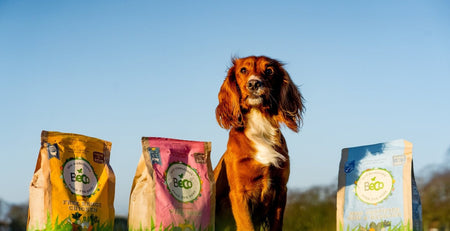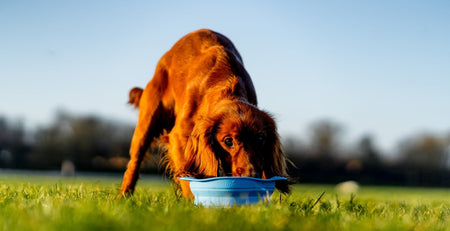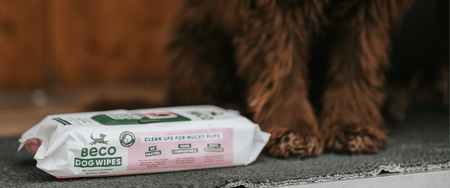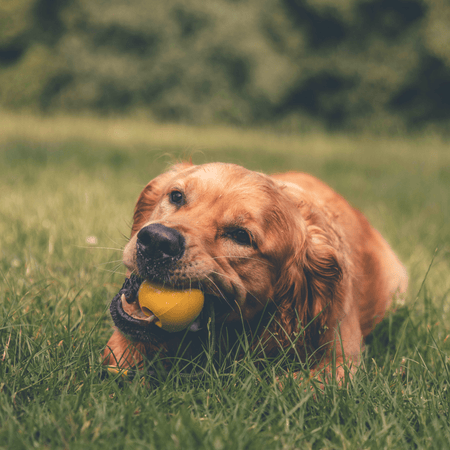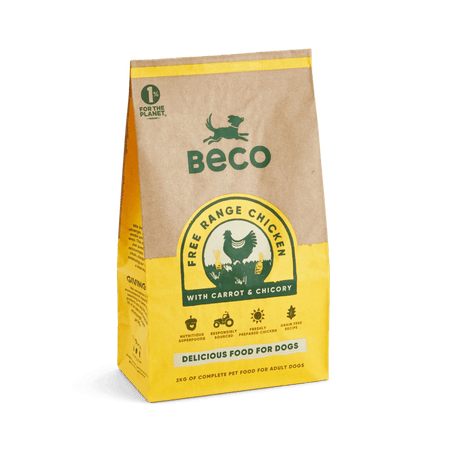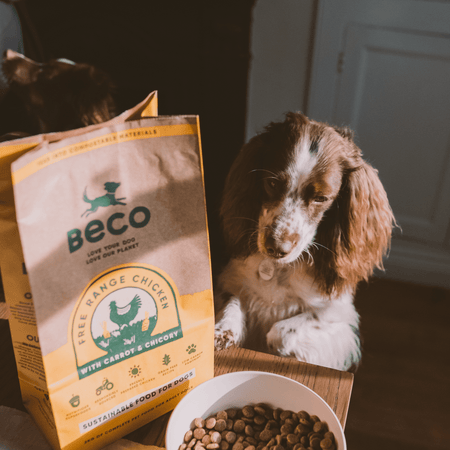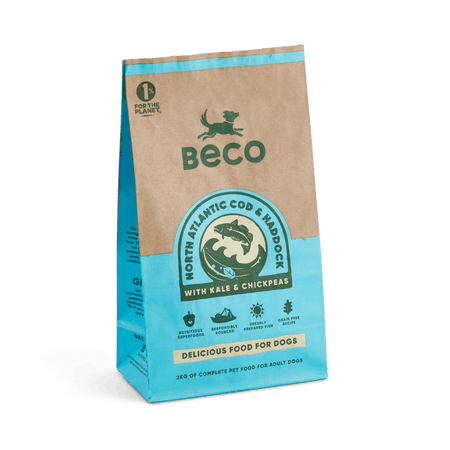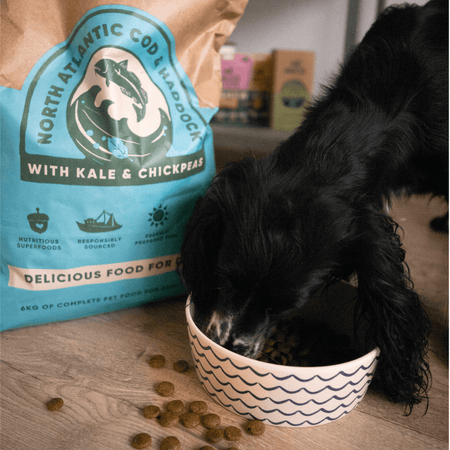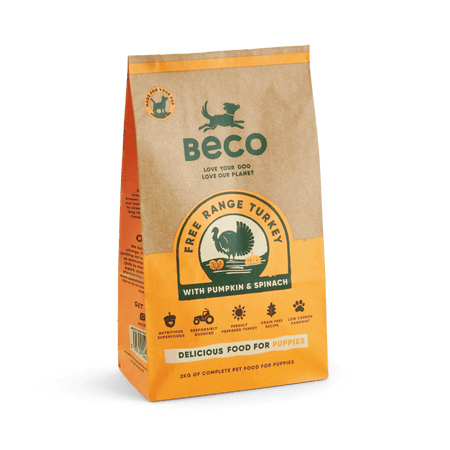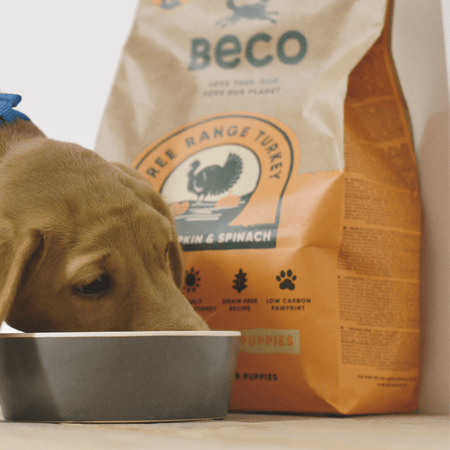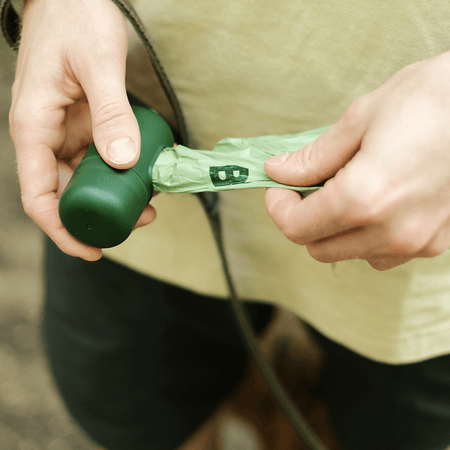Your adult dog’s just snuck some bites from the puppy’s bowl. And now you’re wondering: can adult dogs eat puppy food without consequences?
While an occasional puppy-kibble heist won't harm your grown dog, regular consumption creates health risks.
We've analysed the nutritional science behind age-specific dog foods to bring you straight answers - no guesswork needed.
- Puppy food packs extra calories, protein, and fat that adult dogs don't need - leading to weight gain.
- Adult dogs fed puppy food risk digestive issues and nutrient imbalances affecting kidney health.
- Pregnant, nursing or underweight adult dogs might benefit from puppy food - but only with vet approval.
Is it Bad for Adult Dogs to Eat Puppy Food?
While it’s not bad for an adult dog to eat puppy food, it’s not ideal for long-term feeding. Puppy food is calorie-dense, high in protein and fat, and designed for growth - not maintenance.
Regularly feeding it to an adult dog may lead to weight gain, digestive issues, and an imbalance of nutrients.
However, in certain cases, such as underweight dogs, pregnant or nursing dogs, or senior furry companions struggling to keep weight on - puppy food might be beneficial under veterinary guidance.

Puppy food and adult dog food aren’t the same. Here’s why:
-
Calories – Puppies burn energy like crazy, so their food packs more calories. Adult dogs? Not so much. Extra calories mean extra weight.
-
Protein – Growth mode requires more protein. Puppies get higher levels to build muscle. Adult dogs don’t need as much.
-
Fat – Puppies use fat for fuel. For adult dogs, too much fat equals obesity.
-
Minerals & Vitamins – Puppies need calcium and phosphorus for strong bones. Adult dogs need a balanced intake to maintain joint and muscle health.
What Types of Food Are Best for Puppies vs. Adult Dogs?
| Food Type | Best for Puppies | Best for Adult Dogs |
|---|---|---|
| High-protein kibble | ✅ | ✅ (but in moderation) |
| DHA-rich food (brain development) | ✅ | ❌ |
| High-calorie meals | ✅ | ❌ (unless underweight) |
| Moderate-calorie kibble | ❌ | ✅ |
| Joint-support food (glucosamine) | ❌ | ✅ |
Is Puppy Food Bad for Adult Dogs?
Feeding an adult dog puppy food regularly isn’t ideal. Here’s why:
Weight Gain
Too many calories lead to obesity, increasing the risk of diabetes, arthritis, and heart issues. An overweight dog may struggle with mobility, making exercise difficult and worsening joint problems.
Nutrient Imbalance
High calcium and phosphorus levels aren’t necessary for adult dogs and could cause kidney problems. Excess minerals may also contribute to urinary issues, including the formation of bladder stones.
Digestive Issues
Puppy food is richer, which might upset an adult dog's stomach, causing diarrhoea or bloating. Frequent stomach discomfort can lead to long-term digestive sensitivities or food aversions.
When Is Puppy Food Okay for Adult Dogs?
Not all adult dogs need to avoid puppy food. Some situations make it beneficial:
Underweight Dogs
Puppy food’s higher calories might help your dog gain weight, but check with your vet first. Rapid weight gain can be unhealthy if not monitored properly.
Pregnant & Nursing Dogs
If your dog has had a litter of pups she may need extra calories and nutrients to support lactation and feed hungry little mouths.
It gives her additional energy to nourish her pups, making puppy food a temporary but effective choice.
Senior Dogs Losing Weight
Can senior dogs eat puppy food? If they’re struggling to maintain weight, your vet might recommend it temporarily.
Don’t put your senior furry friend on puppy food before speaking to your vet as some older dogs need special diets for kidney or heart health.
Can a 2-Year-Old Dog Eat Puppy Food?
Technically, yes you can feed a 2–year–old dog puppy food. But should you?
Not unless your pup falls into one of the categories above. Otherwise, it's like feeding a grown adult only energy drinks and protein shakes. Not great long-term.
How to Feed Your Dog the Right Way
Giving your dog the right food means considering their age, weight, and activity level.
Choose Life-Stage-Specific Food
Adult dogs need food that maintains muscle, energy levels, and overall health. The right balance prevents unnecessary weight gain or deficiencies.
Talk to Your Vet
If weight loss, lethargy, or stomach issues occur, your vet should be the first call. They can recommend food that meets your pup’s unique dietary needs.
Portion Control
Overfeeding, even the right food, leads to weight problems. Measuring portions and adjusting based on your dog’s energy output helps maintain a healthy weight.
Frequently Asked Questions
Is puppy food good for adult dogs?
No, puppy food is not usually good for adult dogs. It’s too calorie-dense, high in fat, and richer than what adult dogs need.
Can an adult dog eat puppy food?
It’s not recommended that an adult dog eat puppy food on a regular basis unless there’s a medical reason for this.
Can I give my senior dog puppy food to gain weight?
It is possible to give your senior dog puppy food if they are struggling to gain weight but always consult a vet first.
Conclusion
Most adult dogs don’t need puppy food. It’s packed with extra calories, protein, and fat that can lead to weight gain, digestive issues, and nutrient imbalances.
While a few bites here and there won’t hurt, long-term feeding isn’t a good idea—unless your vet suggests it for a specific reason, like pregnancy, nursing, or weight gain in underweight or senior dogs.
The best way to keep your dog healthy is with a balanced diet tailored to their needs. If you're looking for a nutritious option without unnecessary fillers, check out our grain-free dog food—it’s crafted for happy, healthy dogs of all ages.

